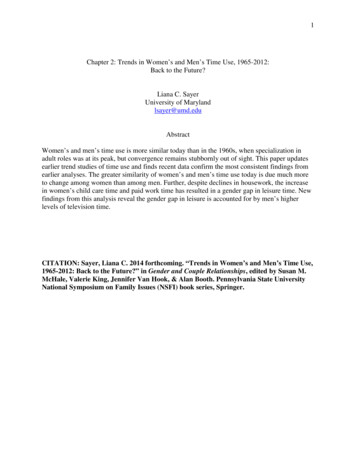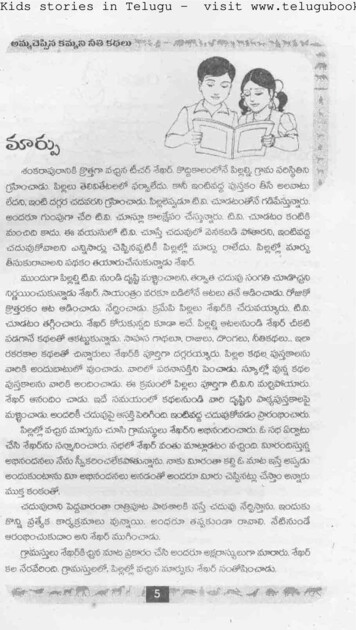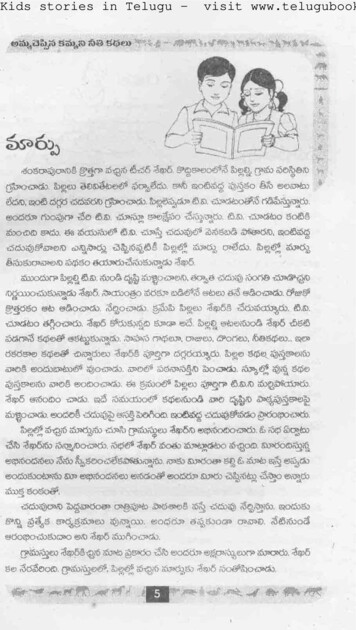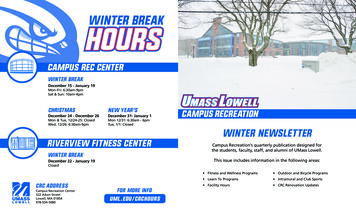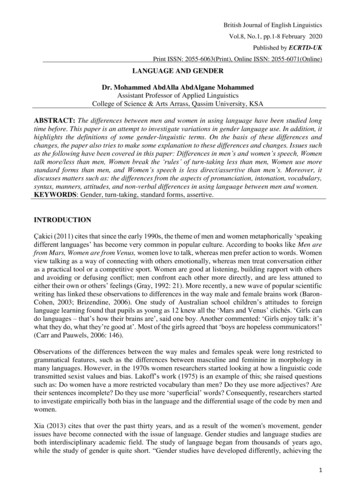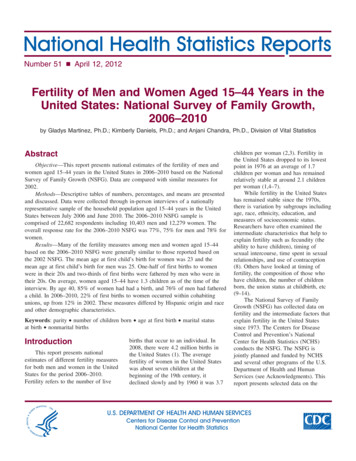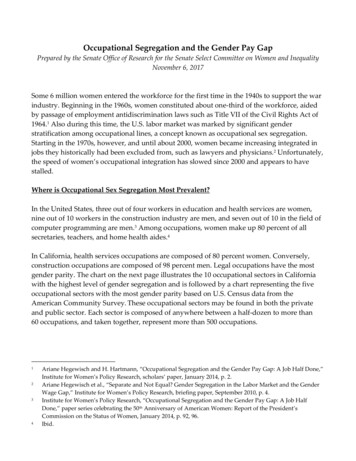
Transcription
CONTENTSCoverAbout the BookAbout the AuthorAlso by Haruki MurakamiTitle PageDrive My CarYesterdayAn Independent OrganScheherazadeKinoSamsa in LoveMen Without WomenCopyright
ABOUT THE BOOKAcross seven tales, Haruki Murakami brings his powers of observation to bearon the lives of men who, in their own ways, find themselves alone. Here arevanishing cats and smoky bars, lonely hearts and mysterious women, baseballand the Beatles, woven together to tell stories that speak to us all.Marked by the same wry humor that has defined his entire body of work, in thiscollection Murakami has crafted another contemporary classic.
ABOUT THE AUTHORHaruki Murakami is the author of many novels as well as short stories andnon-fiction. His books include Norwegian Wood, The Wind-Up Bird Chronicle,Kafka on the Shore, 1Q84, What I Talk About When I Talk About Running,Colorless Tsukuru Tazaki and His Years of Pilgrimage, The Strange Library andWind/Pinball. His work has been translated into more than 50 languages, and themost recent of his many international honours are the Jerusalem Prize and HansChristian Andersen Literature Award.
ALSO BY HARUKI MURAKAMIFICTIONAfter DarkAfter the QuakeBlind Willow, Sleeping WomanColorless Tsukuru Tazaki and His Years of PilgrimageDance Dance DanceThe Elephant VanishesHard-Boiled Wonderland and the End of the WorldKafka on the ShoreNorwegian WoodSouth of the Border, West of the SunSputnik SweetheartThe Strange LibraryA Wild Sheep ChaseWind/PinballThe Wind-Up Bird Chronicle1Q84NONFICTION
Absolutely on Music: Conversations with Seiji OzawaUnderground: The Tokyo Gas Attack and the Japanese PsycheWhat I Talk About When I Talk About Running
HARUKI MURAKAMIMEN WITHOUT WOMENSTORIESTranslated from the Japanese by Philip Gabriel and Ted Goossen
DRIVE MY CARmany times he had ridden in cars driven by women, Kafuku hadreached the conclusion that most female drivers fell into one of two categories:either they were a little too aggressive or a little too timid. Luckily—and weshould all be grateful for this—the latter were far more common. Generallyspeaking, women were more cautious than men behind the wheel. Of course,that caution was nothing to complain about. Yet their driving style tended toirritate others on the road.Most of the aggressive women, on the other hand, seemed convinced theywere great drivers. In most cases, they showed their timid sisters nothing butscorn, and were proud that they, at least, weren’t like that. They were obliviousto the gasps and slammed brakes that accompanied their sudden and daring lanechanges, and to the less-than-complimentary words directed at them by theirfellow drivers.Of course, not all women belonged to one of those two groups. There werethose normal drivers who were neither too aggressive nor too cautious. Somecould even be called experts. Nevertheless, somehow or other, even with thoseexpert female drivers, Kafuku usually sensed a certain tension. There was noconcrete reason that he could point to, but from where he sat in the passengerseat he felt a kind of friction in the air, and it made him tense. His throat wouldturn dry, or he would start saying foolish, totally unnecessary things just to burythe silence.Certainly there were good and bad male drivers too. Yet in most cases theirdriving didn’t create the same charged atmosphere. It wasn’t that they wereespecially laid back. In reality, they were probably tense too. Nevertheless, theyseemed to be able to separate their tension and who they were in a natural—likely unconscious—way. They could converse and act normally even whilefocused on the road. As in, that belongs there and this belongs here. Kafuku hadno idea where this difference between men and women drivers came from.Kafuku seldom drew distinctions between men and women in his daily life.Nor was he apt to perceive any difference in ability between the sexes. Therewere as many women as men in his line of work, and he actually felt more atBASED ON THE
ease working with women. For the most part, women paid closer attention todetails, and they listened well. The only problem occurred when he got in a carand found a woman sitting beside him with her hands on the steering wheel.That he found impossible to ignore. Yet he had never voiced his opinion on thematter to anyone. Somehow the topic seemed inappropriate.Thus when Oba, who ran the garage where he serviced his car, recommended ayoung woman to be his personal driver, Kafuku looked less than thrilled. Obasmiled at his reaction. Yeah, I know how you feel, the mechanic’s face said.“But she’s one heck of a driver. I can guarantee that, no problem. Why don’tyou meet her and see for yourself?”“Sure, since you recommend her,” Kafuku said. He needed to hire a driver asquickly as possible, and Oba was someone he trusted. He had known the impishman with hair that bristled like wire for fifteen years. When it came toautomobiles, Oba’s word was as good as gold.“To be on the safe side, I’m going to take a look at your wheel alignment, butassuming that’s okay, you can pick up your car the day after tomorrow at twop.m. Why don’t I ask the girl to come then too, so you can check her out, maybehave her drive you around the neighborhood? You can level with me if you don’tlike her. No skin off my nose if you don’t.”“How old is she?”“Never got around to asking. But I would guess in her mid-twenties,” Obasaid. Then he gave a slight frown. “Like I said, she’s a great driver, but ”“But?”“Well, how should I put this, she’s not exactly the congenial type.”“In what way?”“She’s brusque, shoots from the hip when she talks, which isn’t often. And shesmokes like a chimney,” Oba said. “You’ll see for yourself when you meet her,but she’s not what you’d call cute, either. Almost never smiles, and she’s a bithomely, to be honest.”“That’s not a problem. I’d feel uncomfortable if she were too pretty, and therecould be nasty rumors.”“Sounds like it might be a good match, then.”“Apart from all that, she’s a good driver, right?”“Yeah, she’s solid. Not just for a woman, but as a driver, pure and simple.”“What kind of work is she doing now?”“I’m not too sure. I think she scrapes by as a convenience store clerk, courierservice driver, stuff like that. Short-term jobs she can drop right away whensomething better pops up. She came here on a friend’s recommendation looking
for work, but things are a bit tight, and I can’t take on anyone full time rightnow. I give her a shout when I need extra help. But she’s really reliable. And shenever takes a drink.”Kafuku’s face darkened with the mention of liquor, and his fingersunconsciously rose to his lips.“The day after tomorrow at two it is, then,” Kafuku said. Brusque, closemouthed, not at all cute—he was intrigued.Two days later, at two in the afternoon, the yellow Saab 900 convertible wasfixed and ready to drive. The dented right front fender had been returned to itsoriginal shape, the painted patch blending almost perfectly with the rest of thecar. The engine was tuned, the transmission readjusted, and new brake pads andwiper blades installed. The car was freshly washed, its tires polished, its bodywaxed. As always, Oba’s work was flawless. Kafuku had owned the car fortwelve years and put nearly a hundred thousand miles on it. The canvas roof wasshowing its age. When it poured he had to worry about leaks. But for the timebeing, Kafuku had no intention of buying a newer vehicle. Not only had the Saabnever given him any major trouble, he was personally attached to it. He loveddriving with the top down, regardless of the season. In the winter, he wore athick coat and wrapped a scarf around his neck, while in the summer he donneddark sunglasses and a cap. He would drive around the city, shifting gears withgreat pleasure and looking up to take in passing clouds and birds perched onelectric wires whenever he stopped at a traffic light. Those moments had been akey part of his life for many years. Kafuku walked slowly around his car,inspecting it closely like a horse before a race.His wife had still been alive when he had purchased it new. She had chosenthe yellow color. During the first few years, they had often gone out for drivestogether. Since his wife didn’t have a license, Kafuku had always been the onebehind the wheel. They had taken a number of road trips as well, to places likeIzu, Hakone, and Nasu. Yet, for what was now nearly ten years, he had alwaysdriven alone. He had seen several women since his wife’s death, but none hadever sat beside him in the passenger seat. For some reason, the opportunity hadnever arisen. Nor had he ever taken the car outside the city, apart from thosetimes when work made it necessary.“There’s some inevitable wear and tear, but she’s in good shape,” Oba said,running his palm over the dashboard, as if stroking the neck of a large dog.“Totally reliable. Swedish cars of this age are built to last. You have to keep youreye on the electrical system, but they’re fundamentally sound. And I’ve beenlooking after this baby really well.”
While Kafuku was signing the necessary papers and going over the itemizedbill, the young woman showed up. She was about five foot five, not at all fat butbroad-shouldered and powerfully built. There was an oval-shaped, purplebirthmark to the right of the nape of her neck that she seemed to have no qualmsexposing. Her thick jet-black hair was fastened at the back, to keep it out of herway. No matter how you looked at her she was hardly a beauty, and there wassomething off-putting about her face, as Oba had suggested. The remnants ofteenage acne dotted her cheeks. She had big, strikingly clear eyes that looked outsuspiciously on the world, their dark brown irises all the more striking becauseof their size. Her large, protruding ears were like satellite dishes placed in someremote landscape. She was wearing a man’s herringbone jacket that was a bit tooheavy for May, brown cotton pants, and a pair of black Converse sneakers.Beneath the white long-sleeved T-shirt under her jacket Kafuku could see herlarger-than-average breasts.Oba introduced her to Kafuku. Her name was Watari. Misaki Watari.“There are no kanji for Misaki—it’s written in hiragana,” she said. “If youneed a résumé I can get you one.” Kafuku detected a note of defiance in hervoice.“No need for a résumé at this stage,” he said, shaking his head. “You canhandle a manual shift, correct?”“I prefer manual,” she said in an icy tone. She sounded like a staunchvegetarian who had just been asked if she ate lettuce.“It’s an old car, so there’s no GPS.”“I don’t need it. I worked as a courier for a while. I’ve got a map of the city inmy head.”“Why don’t we take a little test drive? The weather’s good so we can put thetop down.”“Where would you like to go?”Kafuku thought for a moment. They were not far from Shinohashi.“Take a right at the Tengenji intersection and then drive to the undergroundparking lot at the Meijiya supermarket, so I can do a bit of shopping. After thatwe’ll head up the slope to Arisugawa Park, and then down past the Frenchembassy and onto Gaien Nishi Dori. Then we’ll swing back here.”“Got it,” she said. She asked for no further details about the route. Taking thekey from Oba, she quickly adjusted the driver’s seat and the mirrors. It appearedshe already knew where all the buttons and levers were located. She stepped onthe clutch and tested the gears. Then she pulled a pair of green Ray-Bansunglasses from the pocket of her jacket and put them on. She turned and noddedto Kafuku to signal she was ready to go.
“A cassette player,” she said as if to herself, glancing at the audio system.“I like cassettes,” Kafuku said. “They’re easier than CDs. I use them torehearse my lines.”“Haven’t seen one of those for a while.”“When I started driving they were all eight-track players,” Kafuku said.Misaki didn’t reply, but her expression suggested eight-track players weresomething new to her.As Oba had guaranteed, she was an excellent driver. She operated the carsmoothly, with no sudden jerks. The road was crowded, with frequent stoplights,but she was focused on changing gears smoothly. The movement of her eyes toldhim that. When he closed his own eyes, though, he found it next to impossible totell when she shifted. Only the sound of the engine let him know which gear thecar was in. The touch of her foot on the brake and accelerator pedals was lightand careful. Best of all, she was entirely relaxed. In fact, she seemed more atease when driving. Her blunt, impersonal expression became softer, and her eyesgentler. Yet she was every bit as taciturn. She would answer his questions andnothing more.The absence of conversation didn’t bother Kafuku. He wasn’t good at smalltalk. While he didn’t dislike talking to people he knew well about things thatmattered, he otherwise preferred to remain silent. He sat back in the passengerseat and idly watched the city streets go by. After years behind the wheel, theview from where he now sat seemed fresh and new.He had her parallel park several times on busy Gaien Nishi Dori, a test shepassed easily with a minimum of wasted effort. She had a good feel for the car,and her timing was perfect. She smoked only when they were stopped at trafficlights. Marlboros seemed her brand of choice. The moment the light changed shesnuffed out the cigarette. Her butts had no lipstick on them. Nor were herfingernails polished or manicured. She seemed to wear virtually no makeup.“Mind if I ask you a few questions?” Kafuku said when they wereapproaching Arisugawa Park.“Go right ahead.”“Where did you learn to drive?”“I grew up in Hokkaido, in the mountains. I started driving in my early teens.You have to have a car in a place like that. The roads are icy almost half the year.You can’t avoid becoming a good driver.”“But you don’t learn how to parallel park in the mountains, do you?”She didn’t answer that. Doubtless she found the question not worth botheringwith.“Did Oba explain to you why I need a driver all of a sudden?”
Misaki answered in a flat, emotionless voice, her eyes trained on the trafficahead. “You’re an actor, and you’re on stage six days a week at the moment. Youhave always driven to the theater. You don’t like taxis or taking the subway.That’s because you rehearse your lines on the way. Not long ago you had aminor accident and your license was suspended. Because you’d been drinking alittle, and there was a problem with your eyesight.”Kafuku nodded. It felt as if someone were describing her dream to him.“The eye exam the police required turned up a trace of glaucoma. It appears Ihave a blind spot. On the right side, in the corner. I had no idea.”The amount of alcohol involved was negligible, so they had been able to hushit up. No one had leaked it to the media. But theater management couldn’t ignorethe problem with his eyesight. As things stood, a car might approach him frombehind on his right side, and he would miss seeing it. Management thus insistedthat he stop driving, at least until tests showed the problem had been fixed.“Mr. Kafuku?” Misaki asked. “Is it all right if I call you that? It’s not a stagename?”“It’s an unusual name, but it’s really mine,” Kafuku said. “The kanji mean‘House of Good Fortune.’ Sounds auspicious, but there hasn’t been any payoff asfar as I can see. None of my relatives are what you could call wealthy.”After a period of silence, Kafuku told her the chauffeur’s salary. Not a lot ofmoney. But it was all his theater could afford. Although his name was wellknown, he wasn’t famous like TV and movie stars, and there was a limit to howmuch money could be made on the stage. For an actor of his class, hiring apersonal driver, even if only for a few months, was an exceptional luxury.“Your work schedule will be subject to change, but these days my life iscentered around the theater, which means your mornings are basically free. Youcan sleep till noon if you wish. I’ll make sure you can quit by eleven at night—ifI have to work later than that I’ll take a taxi home. You will have one day offevery week.”“I accept,” Misaki said simply.“The work shouldn’t be that taxing. The hard part will be waiting around forhours with nothing to do.”Misaki did not respond. Her lips were set in a straight line. The look on herface said that she had tackled far more difficult jobs.“I don’t mind if you smoke while the top is down,” Kafuku said. “But pleasedon’t when it’s up.”“Agreed.”“Do you have any conditions?”
“Nothing in particular.” She narrowed her eyes as she carefully downshifted.“I like the car,” she added.They drove the rest of the way without talking. When they arrived back at thegarage, Kafuku called Oba over to give him the news. “I’ve decided to hire her,”he announced.Misaki started working as Kafuku’s personal driver the next day. She wouldarrive at his Ebisu apartment building at half past three in the afternoon, take theyellow Saab from the underground garage, and drive him to a theater in Ginza.They drove with the top down unless it was raining. Kafuku practiced his lineson the way, reciting with the cassette recording. The play was a Meiji-eraadaptation of Chekhov’s Uncle Vanya. He played the role of Uncle Vanya. Heknew the lines by heart, but ran through them anyway to calm his nerves beforea performance. This was his long-standing habit.As a rule, they listened to Beethoven string quartets on the way home. Kafukunever tired of them—he found them perfectly suited to thinking or, if hepreferred, thinking about nothing at all. If he wanted something lighter, he choseclassic American rock. Groups like the Beach Boys, the Rascals, CCR, theTemptations, and so on. The popular music of his youth. Misaki nevercommented on his selection. He couldn’t tell if his music pleased or pained her,or if she was listening at all, for that matter. She was a young woman who didn’tshow her emotions.Under normal circumstances, Kafuku found reciting his lines in the presenceof others stressful, but those inhibitions vanished with Misaki. In that sense, heappreciated her lack of expressiveness and her cool, distant personality. Hemight roar beside her while he rehearsed, but she acted as though she heardnothing. Indeed it was quite possible that her attention was solely focused on theroad. Perhaps driving put her in a Zen-like frame of mind.Kafuku had no idea what Misaki thought of him as a person. Was she kindlydisposed, or unimpressed and disinterested, or did she loathe him and put upwith him just to keep her job? He was in the dark. But it didn’t matter to him allthat much how she felt. He liked her smooth and assured driving, her lack ofchatter, and the way she kept her feelings to herself.After the night’s performance ended, Kafuku washed off his stage makeup,changed his clothes, and left the theater as quickly as possible. He didn’t likedawdling. He knew almost none of his fellow actors. He would call Misaki onhis cell phone and have her drive to the stage door to pick him up. When hestepped outside, the yellow Saab would be waiting for him. By the time he got
back to his Ebisu apartment, it would be a little after ten thirty. This patternrepeated itself on a nightly basis.He had other work as well. He spent one day a week shooting a drama seriesat a TV studio in the middle of the city. It was your garden-variety detectiveshow, but the audience was large and it paid well. He played a fortune-teller whoassisted the female lead detective. To prepare for the role, he had dressed infortune-teller’s garb and set up a booth on the street, where he told the fortunesof a number of passersby. Word had it that many of his prognostications had hitthe mark. When his day of shooting ended he went straight from the studio to thetheater in Ginza. That was the risky part. On weekends, after the matinee, hewould teach a night class at an acting school. He loved working with youngactors. Misaki ferried him around for all these activities. She drove him fromplace to place without the slightest fuss, always on time, so that Kafuku grewused to sitting beside her in the Saab’s passenger seat. On occasion, he even fellfast asleep.When the weather grew warmer, Misaki replaced her herringbone jacket witha lighter summer jacket. She always wore a jacket while working. Probably itwas her equivalent of a chauffeur’s uniform. With the rainy season, the roofremained up more frequently.Sitting there in the passenger seat, Kafuku often thought of his dead wife. Forsome reason, he recalled her more frequently now that Misaki was doing thedriving. His wife had been an actor too, a stunning woman two years his junior.Kafuku was what was generally known as a character actor, hired to playsupporting roles that were quirky in some way or other. He had a long andnarrow face, and had begun to grow bald while he was still quite young. Not theleading-man type. His beautiful wife, on the other hand, was a real leading lady,and her roles and income reflected that status. As they got older, however, hebecame known as a skilled actor with a distinctive persona, while her star beganto wane. But they both respected the other’s work, and so the shifts in theirpopularity and income never caused problems.Kafuku adored his wife. He had fallen deeply in love with her when they firstmet (he was twenty-nine), and this feeling had remained unchanged until the dayshe died (he had been forty-nine then). He hadn’t slept with another woman inall their years of marriage. The urge had never arisen, although he had receivedhis fair share of opportunities.His wife, however, slept with other men on occasion. As far as he knew, therehad been four such affairs. In other words, there were four men who had sharedher bed for periods of time. She had never breathed a word to him, of course, butstill it hadn’t taken him long to figure out that she was sleeping with some other
man in some other place. Kafuku had a sixth sense about such things, and hislove for her made it impossible for him to ignore the signs, however much hewould have liked to. It was easy to tell who her lovers were from the way shetalked about them. Invariably, they were fellow actors working on the same film.Most were younger. The relationship would continue for the few months theywere shooting the movie and die a natural death when the filming stopped. Thesame thing had happened four times, always following the same pattern.Kafuku hadn’t understood why she felt the need to sleep with other men. Andhe still didn’t. Their relationship as a married couple and as life partners hadbeen excellent from the beginning. When time permitted, they talked withpassion and honesty about a wide variety of subjects, and tried to trust oneanother. He had thought they were a most compatible pair, both spiritually andsexually. Others in their circle also regarded them as an ideal match.He regretted that he had not summoned his resolve while she was still alive toquestion her about her affairs. It was a regret that visited him frequently. He hadbeen oh-so-close to asking her. He would have said, What were you looking forin those other men? What did you find lacking in me? But it had been meremonths before the end, and she was suffering terribly as she struggled againsther approaching death. He didn’t have the heart to demand an answer. Then,without a word of explanation, she had vanished from Kafuku’s world. Thequestion never ventured, the answer never proffered. He was lost in thosethoughts at the crematorium as he plucked her bones from the ashes. So lost thatwhen someone whispered in his ear, Kafuku did not hear him.Needless to say, picturing his wife in the arms of another man was painful forKafuku. It could be no other way. When he closed his eyes, the details of theirlovemaking would rise unbidden and then fade away, only to rise again. Hedidn’t want to imagine such things, but he couldn’t help it. The images whittledaway at him like a sharp knife, steady and unrelenting. There were times hethought it would have been far better to never have known. Yet he continued toreturn to his core principle: that, in every situation, knowledge was better thanignorance. However agonizing, it was necessary to confront the facts. Onlythrough knowing could a person become strong.The most excruciating thing, though, had been maintaining a normal lifeknowing his partner’s secret—the effort it required to keep her in the dark.Smiling calmly when his heart was torn and his insides were bleeding. Behavingas if everything was fine while the two of them took care of the daily chores,chatted, made love at night. This was not something that a normal person couldpull off. But Kafuku was a professional actor. Shedding his self, his flesh and
blood, in order to inhabit a role was his calling. And he embraced this one withall his might. A role performed without an audience.Yet if you put these things aside—excluded, in other words, the fact that sheconducted occasional affairs with other men—their married life was calm andcontented. Their careers proceeded smoothly, and they had no financial worries.Over the course of their nearly twenty years together, they made love countlesstimes; for him, at least, the sex had been entirely satisfying. After she contracteduterine cancer and, in what seemed a mere instant later, passed away, he hadbeen lucky enough to meet several women who, in the natural course of things,he had taken to bed. Yet he never experienced the same intimate joy with themthat he had with his wife. All he felt was a mild sense of déjà vu, as if he werereenacting a scene from his past.His management office needed specific information to process Misaki’spaychecks, so Kafuku had to ask her to provide her address, the location of herfamily register, her birth date, and her driver’s license number. She was living inan apartment in downtown Akabane, her family register was in Junitakicho onthe island of Hokkaido, and she had just turned twenty-four. Kafuku had no ideawhere Junitakicho was in Hokkaido. But the fact that she was twenty-fourgrabbed his attention.Kafuku’s wife had given birth to a baby who had lived only three days. It wasa girl. She died on her third night in the hospital nursery. Her heart stoppedwithout warning. When they found her the next morning, she was already cold.The hospital said that she had been born with a defective heart. There had beenno way to verify their story. Nor would finding the true cause of death haverestored her to life. For better or for worse, they had not yet given her a name.Had she lived, she would have been twenty-four years old. Kafuku alwaysmarked the birthday of this nameless child by joining his hands in prayer. Thenhe would think about how old she would have been.As one would expect, the sudden death of their child wounded Kafuku and hiswife, suspending them in a dark, heavy void. It took them a very long time to getback on their feet. They secluded themselves in their apartment, where for muchof the time they lived in virtual silence. Words, they felt, could only cheapen theemotions they were feeling. She took to drinking immoderate amounts of wine.He, for a time, became a passionate, almost fanatical practitioner of calligraphy.It was as if he felt that the black symbols flowing from his brush onto the purewhite paper could somehow lay bare the workings of his heart.Nevertheless, by supporting each other, slowly but surely, the two of themrecovered from their wounds enough to pass through that dangerous period.
Their focus on work became even more intense. When they took on new roles,they immersed themselves totally, voraciously. She told him that she had nofurther desire for children, and he agreed. They would make sure she never gotpregnant again. He was happy to do whatever she wanted.Thinking back, he realized that it was at that time that her love affairs began.Perhaps the loss of their child had reawakened her sexual desire. But that waspure conjecture on his part. Nothing more than another “perhaps.”“Can I ask you something?” Misaki said.Kafuku had been looking out the window at the passing scenery, lost inthought. He turned to her in surprise. They had been driving around together fortwo months, and rarely had she initiated a conversation.“Of course,” Kafuku said.“Why did you become an actor?”“A college friend of mine, a girl, asked me to join her theater club. I’d neverbeen interested in acting. I wanted to play baseball. I’d been the startingshortstop on my high school team, and was pretty confident of my defensiveability. But I wasn’t quite good enough for our college team. So I figured, whatthe heck, I might as well take a stab at something new. I wanted to spend moretime with that girl, too. After I’d been acting for a while, though, it dawned onme that I really liked it. Performing allowed me to be someone other thanmyself. And I could revert back when the performance ended. I really lovedthat.”“You loved being someone other than yourself?”“Yes, as long as I knew I could go back.”“Did you ever not want to go back?”Kafuku thought for a moment. No one had asked him that before. They wereheading for the Takebashi exit on the Tokyo Metropolitan Expressway, and theroad was jammed.“There’s no other place to go back to, is there?” Kafuku said.Misaki didn’t venture an opinion.They were silent for a while. Kafuku removed his baseball cap, inspected itsshape, and stuck it back on his head. Next to them was a tractor trailer with toomany wheels to count, a huge rig that made their yellow Saab convertible feeltransitory, ephemeral. Like a tiny sightseeing boat floating next to an oil tanker.“This may be out of line,” Misaki said, “but it’s been on my mind. Is it okay ifI ask?”“Shoot,” Kafuku said.“Why don’t you have any friends?”
Kafuku looked questioningly at Misaki’s profile. “How do you know I don’thave any?”Misaki shrugged. “I’ve been driving you around for two months now, so Igues
Haruki Murakami is the author of many novels as well as short stories and non-fiction. His books include Norwegian Wood, The Wind-Up Bird Chronicle, Kafka on the Shore, 1Q84, What I Talk About When I Talk About Running, Colorless Tsukuru Tazaki and His Y


